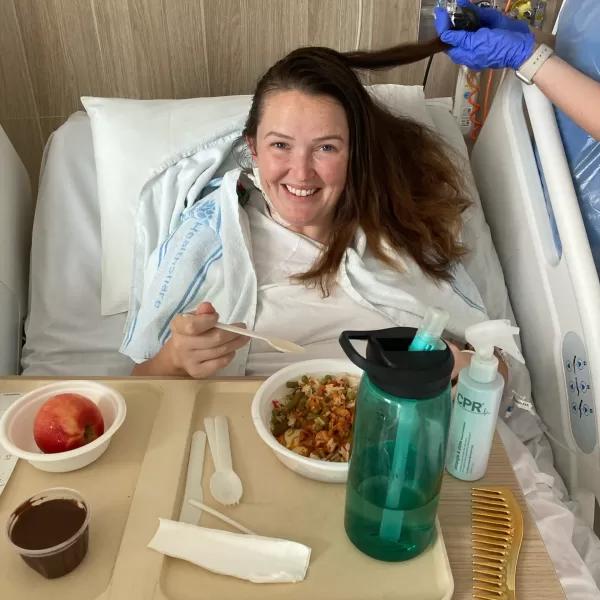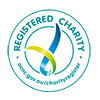During the Christmas holiday season, Lucy found herself at Prince of Wales Hospital, initially concerned about pregnancy complications. However, upon examination by the healthcare staff, it was revealed that Lucy was actually experiencing a neurological condition. While her diagnosis remains pending, Lucy has graciously shared her patient journey, emphasising the comfort and support provided by the healthcare team at Prince of Wales Hospital. Their patient-centred approach during the holiday season has been invaluable to her.
Please introduce yourself and tell us the initial reason you first came to POWH?
My name is Lucy and I was admitted to Prince of Wales Hospital at the start of December. I was 14 weeks pregnant at the time and I came in because I thought I was having some complications with my pregnancy. As it turned out, it was a neurological condition.

What was the process of getting diagnosed by the clinicians here and receiving the treatment?
I came in with like pins and needles in my feet. I had it for the last week in November, sort of like a tingling sensation in my feet. And then over the course of that week, it was progressing up to my waist. When I came in on Sunday morning to the hospital, it was sort of at my hip level and when I was first admitted, I thought it was a urinary tract infection, or perhaps something relating to the pregnancy. Over the course of 12 hours it [pins and needles sensation] progressed and escalated while I was in the emergency department. It came up to my neck and then it quickly turned into a paralysis. I lost feeling in my legs and my left arm and partially my right as well. It was a little bit scary at the time. I literally just thought it was something minor when I initially came in.
I was then quickly moved into ICU because there was a high chance it would affect my breathing and I may have had to be intubated. But as it turns out, I was on a high course of steroids and that sort of subsided the paralysis. I was in ICU for the next two weeks on a high dose of steroids and plex, which is plasma transfer. I had five rounds of plasma. And still at that stage, I didn’t have any movement in my legs. So, I couldn’t move my toes, I couldn’t really move my fingers. I could speak so I was cognisant the whole time and I could eat. It wasn’t very easy going. And then from there I was sort of on a step-down program. Next, they had me moved to the Neuro [Neurology] Ward for the three weeks and then I moved to the Rehab Ward for two weeks, and then I was discharged in January. I’m now part of the outpatient program due to my pregnancy being high risk. I do weekly sessions of rehab and physiotherapy.
I think the pregnancy, it added another layer of complication. I was seen by the neurology team, the immunology team, and the obstetrics team from the Royal Women’s. There were five or six teams that were involved, and it made me feel very safe and reassured knowing that there was so many people involved in my care.
The doctors are still going through the process of diagnosing what happened when I initially was admitted. They have described to me that my symptoms were leaning towards Neuromyelitis Optica (NMO) which is a rare chronic disease. It’s from the same family as Multiple Sclerosis. So, this condition is something that can relapse and flare up throughout my life.
I think it’s one in a million that it had this condition and in most and the best way to describe it is that it’s on the spectrum, so very seamless. The doctors initially wanted to do an MRI but because of the pregnancy I couldn’t do so.
And while it’s still a provisional diagnosis, I think they were very clear and giving me the context of why they can’t exactly diagnose it yet and giving me other comparisons, which helped a lot.
Has life changed for you since being treated here? If so, so what’s your day-to-day like now?
I think I being 32, I never thought something like this would ever happen to me. I guess you’d get a lot of people saying that to you. But I’ve literally had no other health problems. And the weeks leading up to coming to hospital, I had done a charity bike ride from Bondi Beach down to the South Coast. Initially my pregnancy was so easy until my hospital admittance.
Now, today I feel like my normal life is getting back to normal. I’m not able to do the same activities as I was doing before but I’m still going out to walk and swim. I do a little bit of running but not too much. However now it means I’m immunocompromised. When I’m in sitting in area like cafes, travelling on public transport, or going on a plane, I just need to be careful about wearing masks. I unfortunately had COVID two weeks ago, so I had to come back to the hospital for three days. I suppose all these things I didn’t really think about ever and now I really have to think about it.

What has your patient experience been like since coming to POWH?
It was sensational. I honestly can’t fault anybody from the nursing staff. From the doctors to the allied team. I felt really cared for. I felt really in control of what was happening. A lot of the decisions that were being made obviously had to go through different levels of the foetal medical team because so many of the treatments obviously affect the baby and the placenta.
I felt very informed throughout the whole experience. I’m still having regular appointments coming to the hospital for physio, rehab and occupational therapy and then also coming in as a foetal medicine teams and meeting with the obstetrics team, having regular scans.
Why do you think it’s important for potential donors or our supporters to continue to support the Prince of Wales Hospital Foundation?
I guess it’s something I’ve never thought about with the public health system. I feel like I’ve always taken it for granted. It’s only now I realised how far public funding can go for a public hospital like Prince of Wales Hospital. In Australia we’re so privileged because we have access to healthcare. But no one sees’ the amount of research that goes into rare diseases or other conditions like NMO. For example, 10 or 15 years ago, my diagnosis would have been MS but now with proper funding, clinicians and doctors at public hospitals can do medical research to help patients like me with this rare chronic condition I have. Personally, I never realised where that money goes and now understanding how important donor funding is for a public hospital like Prince of Wales is so important.
Because of your continued generosity, patients like Lucy are supported by the exceptional patient care by staff, nurses and clinicians at POWH. Help us continue our mission to Raise Health, Raise Funds, Raise Care and Transform Lives.

